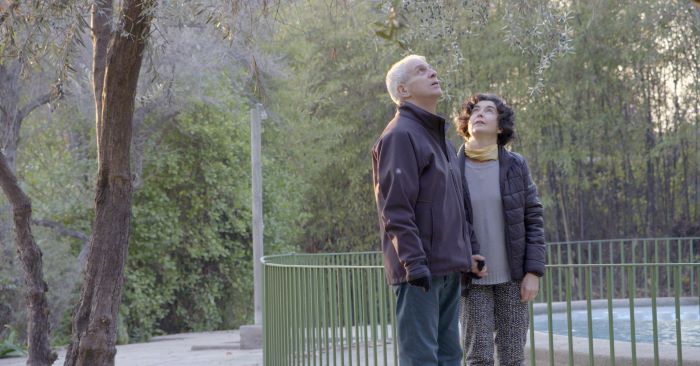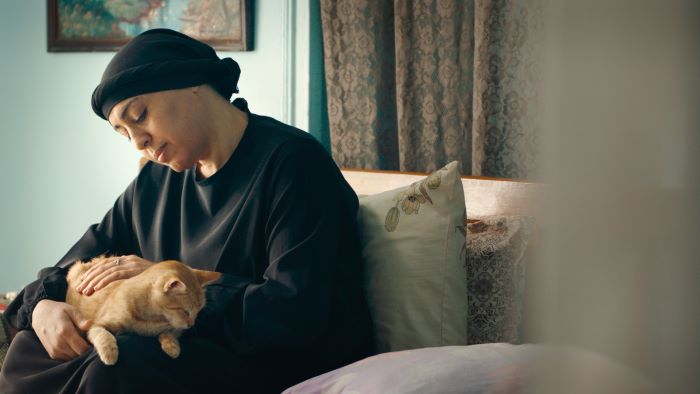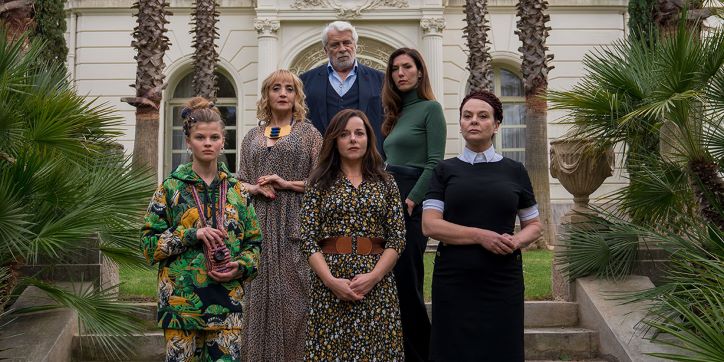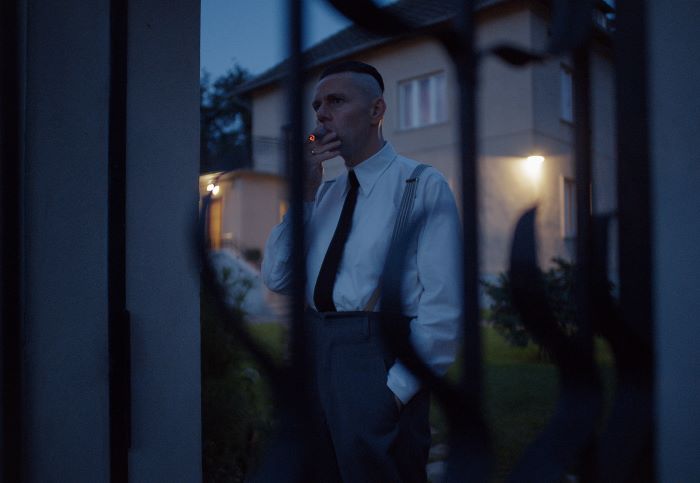The good news is this is not 2020, when the pandemic curtailed moviegoing and the distribution pipeline. This year feels competitive; there are many options in putting together this post, yet strangely, there have been few discrepancies among the various print/online publications and the critics’ awards bestowed so far. (Really, everyone bought the supposed love story in Killers of the Flower Moon?)
What’s the point of a top 10 list if it rubber stamps the usual suspects and mimics so many others? Where are the hidden gems? The sleepers? Out of hundreds of films in release, there must have been at least a handful that disappeared without making a splash. Though several selections below may not be familiar, they are more than worth your attention. Trust me, The Origin of Evil is a fun watch. And it is shocking that the latest film by one of the most acclaimed filmmaking team—Jean-Pierre Dardenne and Luc Dardenne—has nearly been forgotten nine months after its U.S. release.
But two biopics on the list? Yes. Oppenheimer and Maestro both have rejuvenated that tired genre while allowing their respective casts to take center stage. One is an intellectual epic, the other one for the senses. Unfortunately, viewers will most likely watch Maestro when it streams on Netflix without the enhancement of Dolby Atmos to rattle the bones. Kent Turner
Thelonious “Monk” Ellison (Jeffrey Wright) is dealing with a lot on his plate. Placed on temporary leave from teaching, Monk returns to Boston and must confront an onslaught of familial complications, from his sister’s (Tracee Ellis Ross) divorce to his brother (Sterling K. Brown) coming out. Things quickly escalate with a death in the family, followed by his mother (Leslie Uggams) developing early-onset Alzheimer’s disease. And that’s to say nothing of Monk seeing the clichéd book on the Black experience by rival writer Sintara Golden (Issa Rae) achieve glowing reviews, while his literary works struggle to gain traction for not being “Black enough.” So Monk types up an amalgamation of Black story clichés as a joke and under a pen name, only to watch My Pafology get sold, showered with liberal platitudes, and become the talk of the town.
There’s a lot of comedy to be mined from American Fiction’s story, and director Cord Jefferson wisely blends the family drama’s innate humor with an absurdist look at entertainment culture, particularly when Monk attempts to pass his alias off as a hardened ex-con. The movie is serious one moment, teetering on absurdism the next, and filled with a wide roster of jabs at the publishing industry and Hollywood’s strive for diversity. The jokes amplify the drama and vice versa, giving the satire not only bite, but heart as well. Ben Wasserman (In theaters)
In Madeleine Gavin’s often harrowing documentary, several families attempt to flee oppressive, totalitarian North Korea for the freedom of South Korea. Of course, the border is heavily guarded, and even if they try to defect by going through China, that’s not guaranteed to succeed either, since the Chinese also patrol their border and that country has ties to the Kim Jong-un regime. The result plays like a high-stakes thriller, but one with real-life consequences.
Through emotional testimony and smuggled-out cell phone footage, Gavin paints an eye-opening portrait of Kim’s tyrannical rule, whose lengthy human rights abuses include beatings and executions. It’s especially shocking to learn how children are taught from an early age that their leader is all powerful and that Americans—Kim’s biggest nemesis—are subhuman. But the movie is at its most unforgettable when it’s taken over by the breathless and often incredible footage of dissidents attempting to defect with the help of a daring and brave South Korean pastor. With moments almost guaranteed to make some viewers look away, hold their breath, or shed tears, it’s an essential documentary that also works in the mode of a riveting action film. Kevin Filipski (It will air January 8, 2024 on PBS’s Independent Lens)
In her latest documentary, Oscar-nominated director Maite Alberdi (The Mole Agent) focuses on the heartbreaking story of a Chilean couple, crusading journalist Augusto Góngora—who bravely reported on dictator Augusto Pinochet’s murderous regime—and actress Paulina Urrutia, formerly the minister of the country’s National Council of Culture and the Arts. After spending several decades together, Augusto is in the throes of Alzheimer’s and Paulina has become his full-time caretaker, made all the more difficult as his memory of her and their life together is fast fading. (Augusto sadly passed away this May.)
In extremely intimate detail, Alberdi’s camera records this close relationship as Paulina tries to keep jogging Augusto’s memory as well as cherish the moments when he does remember events and names from their shared past—and from his life before they met. Tender scenes of the pair simply going for a walk, Paulina reading to Augusto, or Augusto painfully realizing he cannot stop his cognitive decline are powerfully moving. The “eternal memory” of the title refers to Augusto’s career objective, which countered the Chilean penchant for forgetting the ills of Pinochet’s rule. His reporting helped keep the nation from succumbing to mass amnesia in its attempt to forge ahead afterward. Alberdi doesn’t force the metaphor, but uses it to underpin her portrait of a deeply loving couple who share the best and worst of their lives together. KF (Streaming on Paramount+, available on demand, digital)
Years ago, a Tunisian friend invited me to her sister’s wedding in Tunis. For two weeks, I was confined to the women’s area of the extended family’s house, basically segregated from men except at specific times of day. I tried to fit in, but I was on edge. You never knew when the group’s cooing girl talk would blaze up into a melee of cursing and slapping. This documentary brought back that nearly forgotten anxiety. It veers between raw emotion to distracting beauty, performance to realism, political statements to family secrets.
A Tunisian mother has four daughters, two of whom have defected to Daesh/Isis. Why? The family relives this trauma with the participation of actors, causing lines to blur between reenactment and reality as painful truths emerge. Psychological trauma is illustrated with heavily stylized but super-intense reenactments of an exorcism, beatings, and a live burial. Musings on the meaning of the hijab spin off into other charged questions: What happens when revolutions go wrong? Can religious fanaticism be a reaction to the dysfunctionality within the larger society as well as within a claustrophobic family unit? Volumes could be written about director Kaouther Ben Hania’s film, which is a heavy experience, but made with a high level of commitment and artistry. Caroline Ely (Video on demand, digital)
Bold in subject matter and visual style, especially for a debut feature, Saim Sadiq’s film follows a Pakistani family in Lahore. Haider (Ali Junejo) and his wife Mumtaz (Rasti Farooq) are under societal and familial pressures—particularly from Haider’s stern father—to produce a son. Haider, somewhat reluctantly, ends up taking on a job dancing back-up in a burlesque dance theater group. There he falls for lead trans dancer Biba (Alina Khan), while his relationship with his family and questionings of his own identity become further intensified.
Sadiq’s film—banned in much of Pakistan—offers a rich tapestry of characters (played by a wonderful ensemble), all flawed and conflicted in their ordinariness, who often possess surprisingly nonjudgmental attitudes. As the film veers toward its tragic ending, spry humor still runs throughout. The film delicately wades into themes such as patriarchy and the rigidity of gender roles without becoming didactic. Jeffery Berg (Streaming on the Criterion Channel, video on demand, digital)
Bradley Cooper wrote, directed, and starred in this biopic of the famously influential and multifaceted composer and conductor Leonard Bernstein. His Lenny energetically oscillates between emotional extremes with speed and ease. Yet the film’s strongest performance is perhaps from Carey Mulligan, as his wife, Felicia Montealegre. Note how excellently she portrays the balancing effort to suppress her qualms about Leonard’s extramarital affairs while maintaining her genuine devotion toward him. Mulligan’s performance is a surprising reminder of the depth the actress is capable of, especially in a role that easily could have been shortchanged.
Movies about musicians are often strong when it comes to tackling the mishaps of the artist’s personal life and weaker when it comes to creating the genuine excitement of making music and the ideas of its creator. Maestro is buoyed by its excellent sound design, which is perhaps best felt in a triumphant scene in which Lenny conducts Mahler’s Resurrection Symphony, and in the way his own music recurs throughout. Some of the strongest and most intriguing scenes are those that address the special, sometimes intimate way the musician had of addressing audiences and students. One is toward the end, in which he is teaching conducting. It gives a fine taste of the gift Bernstein had for bringing people closer to the music he loved. Andrew Plimpton (Streaming on Netflix)
Even putting aside the acclaim for having saved cinema because of this film’s huge box-office success, director Christopher Nolan reached a peak as an artist this year. He proves himself once again as a masterful storyteller and magician of cinematic forms. The entrancing power of his immersive style creates something urgent, mature, and entertaining in equal parts without sacrificing complexity.
The biopic of Robert Oppenheimer (an intense Cillian Murphy, transitioning from reliable character actor to improbable superstar) engages with important political and moral questions through the means of spectacle, yet it leaves room for small details: the blasé reasoning of a military officer who decides not to bomb a specific Japanese city because of a personal connection or a long gestating petty vendetta based on a misunderstanding of a harmless gesture. Nolan’s sense of showmanship never fails—like in the Trinity Test sequence—and is unpredictable at every turn.
It is the intertwining of so many ideas that makes this a rare Hollywood blockbuster: It’s about scientists planning life-altering weapons in closed rooms and engaging in long conversations. The film gives hope about the industry’s future, in spite of all the other omens saying otherwise. Gullermo López Meza (DVD/Blu-ray, video on demand, digital)
Whether acting in a comedy or playing a straight role, star Laure Calamy has a special way of portraying women with a lot going on under deceptively flighty exteriors. This thriller’s careening journey lets the actress take her particular nervousness full throttle as a would-be ingenue negotiates a treacherous family dynamic—and her own secrets.
Sick of working in a smelly fish-canning plant and about to be abruptly turfed out of an apartment, Nathalie reaches out to the rich long-lost father who abandoned her as a child. Turns out the women in his orbit don’t want her around the burly and slightly menacing paterfamilias. Nathalie has to play the innocent to appease an eccentric stepmother, an imperious stepsister, and a glowering maid straight out of Rebecca. On the side, she also struggles with a clandestine, highly charged relationship. Soon strain shows and lies begin to surface. As its antiheroine implodes, director Sébastien Marnier’s movie explodes outward. Something that starts out genteelly Chabrolian or Hitchcockian grows De Palmian—creepy, twisty, violent, and even slightly preposterous, with intense female rivalry that includes an explosive fight in a prison shower. Its boggling finale is one many will not see coming, but by the time this exciting, unpredictable film is over, we’re about ready for anything. CE (Video on demand, digital)
In a scene in the Jean-Pierre Dardenne and Luc Dardenne’s latest picture—their finest in years—viewers know something harrowing has happened to a character, but it isn’t shown onscreen, just implied, and it’s also implied that someone else, who has been hiding, has witnessed it. This is illustrative of the filmmakers’ remarkable economy in storytelling and their sensitivity to refrain from exploiting or sensationalizing their characters and situation.
Eleven-year-old Tori and the older, teenaged Lokita are two young West African immigrants barely making ends meet with risky jobs (including working for a repellent chef and a nefarious drug-dealing cartel), supporting each other to survive in an unnamed Belgian city. They work together to help and protect one another: Tori has his papers to live in the country, Lokita does not.
Working with cinematographer Benoît Dervaux, the Dardenne brothers’ filmmaking is strong and naturalistic. The camera often follows the resourceful and ingenious Tori and Lokita, rendering them memorable and powerful characters. Mbundu Joely and Pablo Schils are indelible in their roles, especially Schils as an extremely sympathetic, forced-to-be-wise-beyond-years Tori. In its brief 88-minute running time and scaled-back, impactful approach, the film becomes a moving microcosm of the absurdities and devastations within the bureaucratic immigration system. JB (Streaming on the Criterion Channel, video on demand, digital)
Is there room for another Holocaust feature film? Yes. Freely adapting Martin Amis’s novel, director Jonathan Glazer film’s centers on the other side of the wall of a Nazi concentration camp and the behavior of those in power: the family of Rudolf Höss, the commander of Auschwitz. (Granted, this engrossing, discomforting selection is the definition of a critic’s choice and admittedly an intellectual choice.) Glazer conveys the hellish environment through the off-screen sounds and the detached, limited point of view of his static camera, thus refraining from graphic violence or sensationalizing the horrific.
The viewer becomes a voyeur as the large Höss household is under surveillance. Glazer used hidden cameras throughout the set to capture a life in denial at the top of the Nazi strata. Even when the actors knew where the cameras were located, they were not sure what was being filmed. The result is that viewers feel detached, yet appropriately so, from characters who are completely disassociated with what is occurring only a few feet away. The family purposely ignores the gunshots, the screams, and the bellowing smoke. The film also questions whether or not they are capable of empathy or love, or if signs of affection are really a performance. Additionally, Mica Levi’s score is among the year’s best, hands down. KT (In theaters)
















Leave A Comment